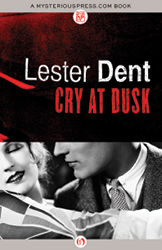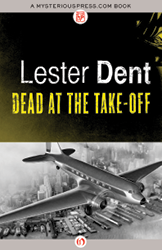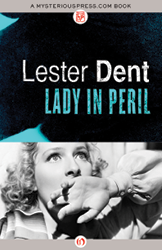Lady Afraid (24 page)
Authors: Lester Dent
Tags: #Fiction, #Mystery & Detective, #Private Investigators

T
HEY TRANSPORTED OLD IVAN
Spellman Lineyack out of the ketch at nine o’clock. Two men in white coats, with a stretcher, assisted by various policemen, muscled the litter ashore. It was a spectacular operation, sulphurous with sound effects. Only one of the litter handlers wasn’t awed by Ivan; suddenly he cursed back, explosively. Ivan was silenced. Ivan, when Mr. Arbogast had bowled him over, had sprained an ankle, hence all this anticlimax.
Most came over to Sarah, grinning. “A hard old case,” he said cheerfully. “It must be a satisfaction to be disliked by him. You know, I’ll sort of hate to see you two make up.”
A man named Gillespie, from the district attorney’s office, then came to Sarah and said, “We’re through with you for the present, I guess, Mrs. Lineyack.”
It was kind of him, and Sarah bent her head gratefully.
Gillespie then told Captain Most, “You too. But you understand you’ll testify against this fellow Arbogast.”
“Yes,” Most said.
Gillespie added, “A lot of cops who spent the night looking for you two wouldn’t care if you were locked up. But I guess that won’t be necessary.”
“I should hope not,” said Most.
Gillespie frowned. “You’re going to have to put up with more questioning. The government is going to have men on it, either the FBI or the Treasury, or maybe both. I imagine there’ll be a large rank odor in the newspapers for some time to come. Arbogast was fairly prominent, as government bureaus measure prominence, and there’ll be political muckraking over it.”
“Did Arbogast admit anything?” Most asked.
“No. He’s a lawyer and understands how to handle himself,” Gillespie admitted. “But we will be able to put together a case. We’ve found two witnesses who saw him early yesterday morning near Mrs. Lineyack’s apartment with a fellow answering Dewey Cokerham’s description. We figure he was pointing out Mrs. Lineyack so Cokerham would know her.”
Sarah, amazed, said, “I
did
think it was unusual when Mr. Arbogast got on the bus that morning. But then I didn’t give it any more thought.”
“Well, we’ve put him in the neighborhood of your apartment with Cokerham. That isn’t important by itself, but it’s a sample of a lot of small stuff. When we tie it all together, it’s going to make a picture.”
Most asked, “You do any good on that telephone call he received at his apartment when we were there? The one he said the police made?”
“Brother, that’s going to put the rope around his neck,” Gillespie said. “You know what Brill did? Made the phone call from the lobby. The operator saw him, and saw him meet Arbogast when the latter came downstairs. They went outdoors together. A bit later Arbogast came back, rode up in the elevator—the elevators are the self-service type without an operator at night—and made a phone call from the telephone in the elevator to the phone in his own apartment. That was the call you got, Mrs. Lineyack. You said you believed that was how he tricked you. Well, it was…. And another piece of luck—an officer found a bloodstained chunk of coral rock in the parking area beside the apartment. No fingerprints, of course. But the bloodstain matches Brill’s type, and Brill’s hair was on it, and Brill’s scalp was lacerated in the back. That places the crime at the spot tentatively. Circumstantial, of course. But with enough of that sort of thing, we’ll do a job on Arbogast.”
Before leaving the car in which Sarah, Jonnie, and Most had been waiting, Gillespie leaned over with a grin and said to the little boy, “So long, cowpuncher.” But Jonnie was playing with Sarah’s fingers; he did not look up. Sarah had been showing him how, by stacking the fingers of a hand one atop the other, one could cause the hand to cast a shadow that variously could be the head of an ostrich, or a chick, or, with pinkie finger erected, an ole rabbit. Jonnie was not interested in Mr. Gillespie, who then laughed pleasantly and went away.
A policeman in uniform came next, desiring to know whether Lida Dunlap had short or long hair. Long hair, Sarah told the officer. “We figure a woman will dye her hair but isn’t likely to cut it,” the policeman explained. “Thanks. I imagine we’ll eventually pick up the Dunlap woman, as well as Cokerham and the one with the yellow shoes.”
Most had waited not too patiently. Then he threw it all aside with a movement of shoulders, saying, “I guess we can consider it wound up.” Then, after a moment of narrow-eyed introspection, he amended, “The violent part of it, anyway.”
Sarah nodded and said, “I’d like to go to Alice Mildred. They took her home and said they would call her physician.”
“Of course,” Most said. But he said it vaguely, and she rather got the idea that there was more on his mind and that he was weighing whether this was the time or the place for it. If she was correct, he decided against saying it, because he asked Jonnie, “You want to drive, skipper?” The little boy jumped onto his lap happily, and Most started the engine and, smiling, let the boy pretend to steer. Most was silent during the whole drive to the Lineyack home. His mood seemed settled rather than pensive. He wore no hat, squinted in the sunlight, and held his pipe in a hand and thumb-stroked the briar bowl occasionally. Settled, Sarah thought, but yet with something on his mind too.
At the Lineyack place Most parked brazenly in the driveway. It reminded Sarah of the long, terrible, furtive night, and she shuddered.
A man had been waiting for Sarah in the little reading room. He arose quickly, introducing himself. Dr. Danneberg. Sarah, who had visualized Alice Mildred’s doctor as different, masked surprise. Dr. Danneberg was young, intense, and very reassuring of Alice Mildred’s prospects.
The doctor spoke then of hypersensitivity, mental over-intensity, sociophobia, and the difficulties attendant to a cerebrosis such as Alice Mildred’s. In her case a rescue apparently now stood effected, probably by the endowment of the right to live as an individual. Dr. Danneberg used more and larger words than these, but Sarah suspected that what he meant in general was that Alice Mildred was saved by being shown Ivan wasn’t omnipotent, all-terrible.
Sarah was tempted to ask the doctor if he knew he’d stirred Alice Mildred up and started all this. She resisted the temptation. The doctor might not have a nomenclature to cover the situation.
Pleased with her, Dr. Danneberg got his hat. He said his good-bys to her, to Most—looking strongly and speculatively at Most the while. And, toward the last, approvingly. The doctor liked Most, Sarah decided, going to the door with him. And then it came to Sarah that the doctor’s concern had not been in existence at first, but had developed as he spoke with them. Brought on, Sarah wondered, by what? Of course Dr. Danneberg understood by now that Sarah would in the future have the status of one of the family, and he would be interested in her as a result. But why so interested in Most? Sarah was wondering about that when the doctor departed.
Curiously, Sarah glanced at Most and quickly realized she’d caught him unawares while he was looking at her. Good lord! she thought. No wonder the doctor saw, and was concerned about the man Most is.
Her own face, she knew in a moment, must have the writing upon it as plainly as Most’s had, for now she saw a quiet certainty come to Most. He was sure of her; that was what this assurance said. It was all right; it was nice. It was even what she wanted…. But then no woman likes a man to have that confident look, that sureness about her.
“I believe I’ll make us some coffee,” she said, and turned and walked away, leaving him to work that one out for himself.
All rights reserved, including without limitation the right to reproduce this ebook or any portion thereof in any form or by any means, whether electronic or mechanical, now known or hereinafter invented, without the express written permission of the publisher.
This is a work of fiction. Names, characters, places, events, and incidents either are the product of the author’s imagination or are used fictitiously. Any resemblance to actual persons, living or dead, businesses, companies, events, or locales is entirely coincidental.
Copyright © 1948 by Lester Dent
Cover design by Biel Parklee
978-1-4804-4616-8
This 2013 edition distributed by MysteriousPress.com/Open Road Integrated Media
345 Hudson Street
New York, NY 10014









